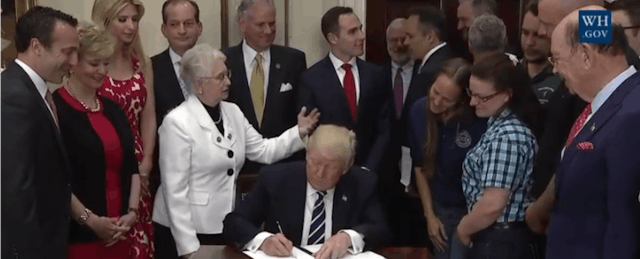When President Donald Trump held a ceremony at the White House today to celebrate apprenticeship programs, he talked of the “dignity of work” and stressed that apprenticeships get students “great jobs” without the “crippling debt of traditional four-year colleges degrees.”
Then he signed an executive order asking the U.S. Labor Department to create a new set of rules streamlining the process companies go through to establish registered apprenticeship programs, which would greatly reduce government oversight.
“We have regulations upon regulations, and in history nobody has gotten rid of so many regulations as the Trump Administration,” the president said before signing the order. “We will be removing federal restrictions that have prevented many different industries from creating apprenticeship programs.”
Some education leaders worry that reducing regulations could lead to programs that lack educational heft or exploit workers. Others, though, say that Trump’s action might address what they see as the biggest challenge facing apprenticeship programs: increasing awareness among those who might benefit from them. For that, Trump has latched onto a slogan that has been floating around the sector: “earn while you learn.”
Apprenticeship programs have enjoyed bipartisan support, and the Obama administration’s efforts in the past two years increased the number of registered programs from 375,000 to 530,000. As part of those efforts, many community colleges have expanded their roles in helping set up and provide educational components for apprenticeship programs.
One such community college is Harper College, located outside of Chicago. It has become a sponsor of registered apprenticeship programs offered by companies, meaning that it streamlines the process by doing all the administrative work. “If there are companies that don’t want to do all the paperwork, I can do it,” says Rebecca Lake, dean of workforce and economic development at the college. “In little companies, you have Mildred who does HR and does all the payroll, and your’e asking her to do all the paperwork for a registered apprenticeship program. It’s easier if the company works with a community college.”
Other colleges have started playing that role in the past couple of years, as the range of industries offering apprenticeships has expanded. “It’s not just for building construction or [United Auto Workers] anymore,” Lake adds. “It really is for things like healthcare, cybersecurity, private security—the non-traditionals are a big focus.”
Eric M. Seleznow, a senior advisor at the nonprofit Jobs for the Future (which has a new Center for Apprenticeship and Work-Based Learning), says he is “happy to see the momentum on apprenticeships continue.” He knows the existing federal rules well, having served as deputy assistant secretary to the Department of Labor during the Obama administration. “We’re concerned that the quality of apprenticeships be maintained,” he says. “Registered apprenticeships are a sign of quality, rigor, and standards, and we have to maintain those standards.”
“Yes, it’s a difficult process. Yes, it could be simplified, but we don’t want to throw out the baby with bathwater,” he adds. “Microsoft, Amazon, Hartford—they all do it, just as thousands of companies are doing it,” he says of the existing system.
Matthew Hora, an assistant professor of adult and higher education at the University of Wisconsin at Madison, says he’s also concerned about making sure apprenticeship programs are done fairly (though he says that is typically a bigger issue with internship programs than with apprenticeships). He wished the policy debate would focus more on the educational components of apprenticeships and less on the employment side.
“The positive aspect that I’m really excited about as a learning scientist is the emphasis of experiential learning,” he says. “The experiential learning element of apprenticeships is absent from any conversations about apprenticeships—they’re overlooking one of the core pedagogical benefits.”
State leaders in Wisconsin have been touting apprenticeships recently, and earlier this week Trump, along with his daughter Ivanka, participated in a workforce roundtable at Waukesha County Technical College in Milwaukee. There, he said that he wants to increase the number of apprenticeships programs to 10 times what they are now.
Hora says there has been a pattern among Republican lawmakers to talk about workforce programs while reducing funding for the underlying education system that supports them. “There’s all this talk about how higher education is failing to produce skilled workers, but at the same time there’s not an investment in the very engine of skill production.”
Trump’s proposed budget does not increase funding for apprenticeships over last year’s funding, though he has called for an additional $200 million to apprenticeship grants—doubling existing funding—by shifting money from other workforce programs.
Ms. Lake, of Harper College, says she has confidence in the Labor Department to draft rules that will maintain quality standards.
She says that her biggest concern, one shared by other colleges working in the space, is awareness. “I don’t think the general public knows that we have these registered apprenticeship programs,” she says. “We need more advertising on TV, social media, wherever it is, to let people know about apprenticeship programs—we don't have enough.”
And if the president who long headlined a show called “The Apprentice” can help do that, she’s happy for the attention.


